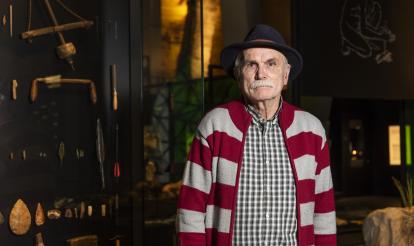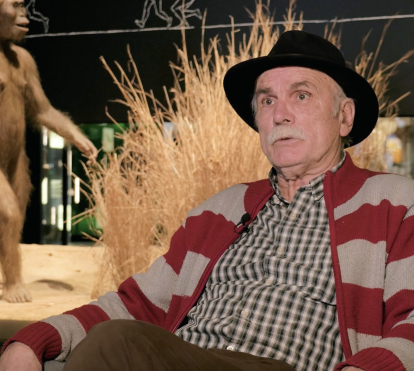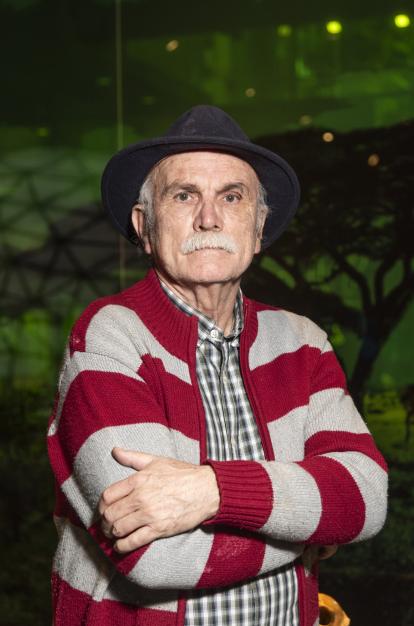
You are reading:

You are reading:

06.05.24
7 minutes readIf there is an emblematic figure in the world of palaeontology in Spain, it is Eudald Carbonell (Ribes de Freser, 1953). The former co-director of the Atapuerca sites has dedicated his life to studying the origin and evolution of human beings, and has made some of the most significant discoveries about the first inhabitants of Europe. An author committed to the dissemination of scientific knowledge, on 28 February he gave a lecture on Humanity and the future at the CosmoCaixa Science Museum, where he explained what the keys to ensuring the continuity of our species should be.
You often say that you’ve been a palaeontologist since you were five years old.
That was when I started my first collection of marine fossils, collecting them without knowing anything, just because some people told me that in one area there were remains of antediluvian animals.
At that time you had no idea that you would become co-director of the Atapuerca excavations, one of the most important in the world. What makes those sites such a special place?
All the human species found in Europe have also been located in Atapuerca, concentrated in a single site. In addition, the first evidence of cannibalism was found there and some use of language has been reported, which we’ve inferred from the discovery of small, highly developed ear bones. The first human genome was also sequenced by recovering protein material from the tooth enamel of Homo antecessor, to name but a few of the things we’ve discovered.
And what has that meant for you personally?
On a human level, I’ve learnt how to build a comprehensive team that has established connections between different academic disciplines. It’s been a very difficult task, but an exciting one, a task that has been fundamental for me. Without Atapuerca I wouldn’t be who I am.
You once said that becoming an archaeologist was the biggest mistake of your life.
I mean that archaeology has given me everything, but, for that very reason, I no longer ask anything of it. I don’t regret it, but if I were born again I wouldn’t be an archaeologist.

In recent years you’ve focused your work on reflecting on the future and you assert that we’re heading towards the end of the species. Why?
Our form of social organisation will lead us to collapse because it responds to a type of development that makes us contradict what we are. Our species is still in the process of humanisation, even if we think we’ve already achieved it; but being human is something linked to solidarity and interdependence, and we’re not taking the necessary actions to be so. We’re in battle with the environment, with the natural world. As long as we go on like this, we won’t be human.
If we fail to humanise ourselves, what will we become?
The paradox is that we may dehumanise ourselves before we become humanised; that is, technology will turn us into transhumans and we’ll be something like what we see in science fiction: a mixture of organic and inorganic beings. This process of transformation is advancing rapidly and we’ll certainly see it in 50 or 100 years.
What’s your opinion of technology in this future development?
Technology and language have helped us become the species we are. Fire, for example, brought together technical and communicational elements. Around it, people talked and documented, and that’s how ideas were shaped. Now, the same thing is happening with artificial intelligence: it’s making it easier for people to communicate and for many of our devices to work. In the future, a unified intelligence will emerge that will be more human than artificial; natural and artificial at the same time.
You advocate the need for a critical awareness of the species. What would that consist of?

Critical awareness already exists, it appeared on the planet in 1962 with the Cuban missile crisis, when the possibility of a nuclear winter was real. The great physicists who had created the atomic bomb warned the military that if it was used it would destroy the planet. It could also be seen in the demonstrations against the war in Iraq. These moments are examples of the socialisation of the critical awareness of the species.
Would it be a collective understanding of what it means to be human?
There are different kinds of awareness. Class awareness, for example, is what social groups have when they’re fighting for their own expansion. Critical awareness of the species is the struggle of humanity in its extension across the planet. There’s also cosmic awareness, in relation to space. These are different layers of awareness.
You defend a planetary vision, but are critical of globalisation. Why?
Globalisation is the worst thing mankind has done because it has put an end to diversity, to what kept languages and cultures alive. It’s a system that unifies and standardises. An example of this is the countryside. The depopulated areas of Spain haven’t emptied themselves; there’s been an intention for social products to become urbanised.
What steps do you think our governments should take to correct this situation?
We should take important steps, but in reality there should be no leaders or hierarchical structures. For many years they’ve only served to prevent things from working as they should.
Would we be better off without leaders?
Animals have leaders because it’s a logical and natural way of organising themselves, but we are in a phase of rationality and we think in a denaturalised way. The times have changed and being human means relating to each other in a different way, without criteria of hierarchy. Furthermore, we have experience with technology, and that would allow us to have a different world, one that operates under different rules.
In your essays you also defend the need to feminise society. In what sense?
For a long time it was thought that 50% of the species didn’t have to contribute to the rules of social functioning, simply because of sexual dimorphism. It was an asymmetry that denied the perspective of this 50%. This is one of the examples of the malfunctioning of the system, and it’s a pity, but fortunately it is being corrected.
Is there anything you would like to see in the coming decades?
In the medium term, I’d like to see whether there will be more human species. People are already genetically modifying themselves to treat diseases, and I think that by the end of the 21st century this will lead to a diversity of human species.
Genetically modified species?
It’s controversial, but I believe that ethics will give way to biological and social inheritance. It will be inevitable, like Luddism in the 19th century, which believed that machines would destroy the world, and the machines have built it. There’s been a poor distribution of resources, but the world always continues going forward.
Listening to you, one never knows whether you’re an optimist or a pessimist.
My message is one of hope. I believe that the human being has something within that grows and develops, which is unshakable and will always be there; that’s the basis of all movement and all dreams. Hope and perseverance are the two most important things for the future. Without them, there will be no planet.